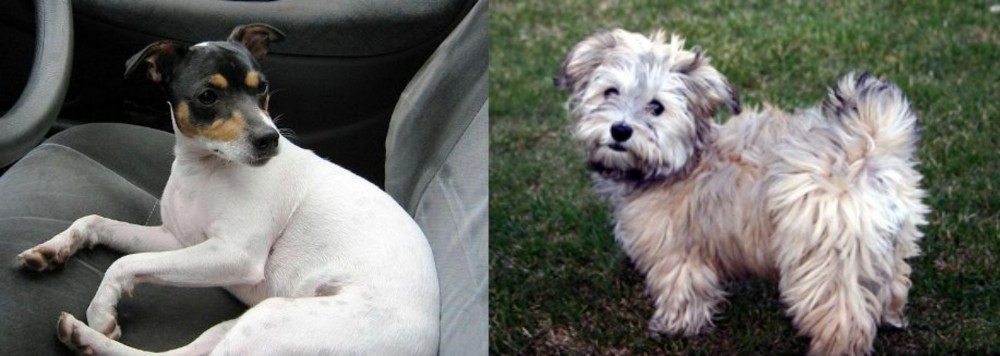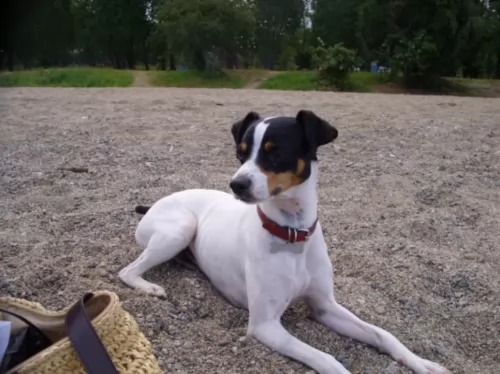 Chilean Fox Terrier is originated from Chile but Havapoo is originated from United States. Both Chilean Fox Terrier and Havapoo are having almost same height. Both Chilean Fox Terrier and Havapoo are having almost same weight. Both Chilean Fox Terrier and Havapoo has almost same life span. Both Chilean Fox Terrier and Havapoo has almost same litter size. Chilean Fox Terrier requires Low Maintenance. But Havapoo requires Moderate Maintenance
Chilean Fox Terrier is originated from Chile but Havapoo is originated from United States. Both Chilean Fox Terrier and Havapoo are having almost same height. Both Chilean Fox Terrier and Havapoo are having almost same weight. Both Chilean Fox Terrier and Havapoo has almost same life span. Both Chilean Fox Terrier and Havapoo has almost same litter size. Chilean Fox Terrier requires Low Maintenance. But Havapoo requires Moderate Maintenance
Basic Information
undefined
Chile
United States
Life Span:
12 - 15 Years
10 - 14 Years
Other Names:
Chilean Rat Terrier, Terrier Chileno or Ratonero
Poovanese, Island Mini Doodle, Havadoodle, Havanesepoo, Havanesedoodle
Colors Available:
White, tan and black
brown, grey, tan, white, black
Coat:
Short and dense
soft, hypoallergenic fur
Temperament:
Affectionate, Alert, Cheerful, Courageous, Curious, Energetic, Friendly, Independent, Intelligent, Lively, Loving, Loyal, Outgoing, Playful, Protective, Responsive, Social, Territorial
Affectionate, Energetic, Friendly, Gentle, Intelligent, Loving, Outgoing, Playful
Grooming:
Low Maintenance
Moderate Maintenance
New Owners Friendly:
Yes
Yes
History
 The Chilean Fox Terrier, developed in Chile, is a dog breed which comes from crossing the British Fox Terrier with some of the local Chilean dogs.
The Chilean Fox Terrier, developed in Chile, is a dog breed which comes from crossing the British Fox Terrier with some of the local Chilean dogs.
The dog is thought to have been developed in the 19th century already, some time between 1790 and 1850.
The dog is known for its skills in catching rats and mice. Known also as the Chilean Rat Terrier, Terrier Chileno or Ratonero, the Chilean Fox Terrier hasn’t achieved formal recognition with any of the leading canine organizations.
The Havapoo is usually a cross with a miniature Poodle and a Havanese but other poodle sizes such as the toy can be used. This is a fairly new cross breed just getting the attention of the American public. The result is a friendly, small dog. They have a striking appearance and lovable personality. They are easy to train and very smart. Not much is know about their heritage except that they were developed in the United States sometime in the past 30 years. Given the long history of the parental breeds, you can count on the quality and beauty of the Havapoo.
Description
 The Chilean Fox Terrier looks almost identical to his ancestors. He stands between 30 – 40cm and weighs between 5 to 9kg.
The Chilean Fox Terrier looks almost identical to his ancestors. He stands between 30 – 40cm and weighs between 5 to 9kg.
He is squarely proportioned, he is athletic looking and well muscled with long, slender legs. Many of these dogs are born with naturally short tails, but if not, then the tail is usually docked after the first or second vertebrae. Now that docking is falling out of favor, the breed is losing that distinctive look.
The head of the Chilean Fox Terrier is triangular with the muzzle being somewhat shorter than the Smooth Fox Terrier. The ears of the Chilean Fox Terrier are smallish and high set, being partially erect. The coat of the dog is short and thick and essentially white while the face is usually tan and black.
Temperament:
The Chilean Fox Terrier is loyal with his human family and can fit in well with a family where there are children and other pets.
Training and socialization become necessary for the dog so that he becomes obedient and amicable around his family and with strangers. He isn’t an aggressive dog but he is alert and can make an excellent watch dog.
He is dominant and confident and also intelligent and easily trainable. He is an active dog so he will require exercise every day, whether he lives in the city or in the country.
The look of the Havapoo is unpredictable in first generation mixes as the puppies can appear like either of the parents. Most however have carried on the facial features of the Havanese. They usually have soft coats with hypoallergenic fur that comes in brown, black, grey, white and tan.
The white dogs tend to be deaf or perhaps even blind.
They are really good looking dogs whichever parent they favor.
Characteristics
 The Chilean Fox Terrier is a lively dog with an alert expression. He has become a popular companion dog, being less aggressive than other Terriers.
The Chilean Fox Terrier is a lively dog with an alert expression. He has become a popular companion dog, being less aggressive than other Terriers.
When you treat him well he becomes a loyal friend and forms a strong bond with his human owners. He gets on well with children who have been taught to respect animals, but he tends to become a bit aggressive around other dogs of the same sex.
Socialization and training however can make him much more relaxed around other dogs.
He is an attractive little dog with his short coat, giving the appearance of being well groomed. He can adapt to country- or city life too. He is such an easy dog to keep too so why not choose him as your 4-legged family member? He promises to make the perfect family companion.
1Children friendliness yes but monitor their interaction so the dog does not get hurt.
2.Special talents highly intelligent and love to run
3.Adaptability Home or apartment is fine but would love a fenced yard to run in.
4.Learning ability very high smart and loves to learn
Health Problems
 The Chilean Fox Terrier is a healthy breed who doesn’t appear to have any particular health issues. It doesn’t mean that your dog will be free from disease, but it is worth knowing that a quality diet, fresh water and lots of love and attention does enhance longevity in a pet.
The Chilean Fox Terrier is a healthy breed who doesn’t appear to have any particular health issues. It doesn’t mean that your dog will be free from disease, but it is worth knowing that a quality diet, fresh water and lots of love and attention does enhance longevity in a pet.
It is to your benefit to know about one or two common diseases that your dog could get.
Bloat:
You’ll notice your pet’s stomach being swollen. Bloat is a disease which can become dangerous because the stomach can twist. Once this happens, gas can’t escape from the stomach and your pet will want to vomit, he’ll salivate and you’ll notice unusual restless kind of behavior. You need to get him to the vet as soon as possible.
Kidney Disease:
This is also a disease that any dog can develop and can be a complication of another pet disease such as Lyme disease. One of the first signs of kidney disease in dogs is drinking more often than usual and also urinating more often.
He’ll lose his appetite and be lethargic and likely lose weight. Kidney disease is a serious disease and you will need to get your pet to the vet as soon as possible.
Even though first generation mixes have no genetic health issues. There are however some issues they are prone to:
• Deafness - primarily in the white dogs, nothing can be done for it.
• Cataracts – can lead to blindness
• Hypothyroidism – can be medicated
• Hip Dysplasia – can lead to lameness
• Patellar Luxation – can lead to lameness
Caring The Pet
 The Chilean Fox Terrier is a low maintenance breed and this means you won’t be having to part with any money on grooming sessions for him. He’ll basically require a brushing twice a week.
The Chilean Fox Terrier is a low maintenance breed and this means you won’t be having to part with any money on grooming sessions for him. He’ll basically require a brushing twice a week.
The Chilean Fox Terrier, as a smaller dog breed, will also require regular dental brushing, as neglecting this can result in dental problems as well as a host of diseases that are associated with gum disease and tooth decay.
Make sure to feed him a quality diet full of vitamins and minerals and ensure he always has fresh, cool water available.
1Feeding the puppy – feed a high quality puppy food for small or toy dogs. Feed 3-4 times a day a total or 1 cup.
2.Feeding the adult - feed a high quality puppy food for small or toy dogs. Feed 3-4 times a day a total of 2 cups
3.Points for Good Health – overall good health
4. Games and Exercises – needs some moderate exercise and would love a fenced yard to run in. Will play fetch and some are good at agility.
Comparison with other breeds
- Chilean Fox Terrier vs English Bulldog - Breed Comparison
- Chilean Fox Terrier vs German Shepherd - Breed Comparison
- Chilean Fox Terrier vs Golden Retriever - Breed Comparison
- Chilean Fox Terrier vs Labrador Retriever - Breed Comparison
- Chilean Fox Terrier vs West Highland White Terrier - Breed Comparison
- Chilean Fox Terrier vs French Bulldog - Breed Comparison
- Chilean Fox Terrier vs Beagle - Breed Comparison
- Chilean Fox Terrier vs Yorkshire Terrier - Breed Comparison
- Chilean Fox Terrier vs Poodle - Breed Comparison
- Chilean Fox Terrier vs Rottweiler - Breed Comparison
- Chilean Fox Terrier vs Boxer - Breed Comparison
- Chilean Fox Terrier vs English Pointer - Breed Comparison
- Chilean Fox Terrier vs Siberian Husky - Breed Comparison
- Chilean Fox Terrier vs Doberman Pinscher - Breed Comparison
- Chilean Fox Terrier vs American Bully - Breed Comparison
- Chilean Fox Terrier vs Abruzzenhund - Breed Comparison
- Chilean Fox Terrier vs Affenpinscher - Breed Comparison
- Chilean Fox Terrier vs Afghan Hound - Breed Comparison
- Chilean Fox Terrier vs Aidi - Breed Comparison
- Chilean Fox Terrier vs Airedale Terrier - Breed Comparison
- Chilean Fox Terrier vs Akbash Dog - Breed Comparison
- Chilean Fox Terrier vs Akita - Breed Comparison
- Chilean Fox Terrier vs Africanis - Breed Comparison
- Chilean Fox Terrier vs Askal - Breed Comparison
- Chilean Fox Terrier vs Atlas Terrier - Breed Comparison
- Havapoo vs English Bulldog - Breed Comparison
- Havapoo vs German Shepherd - Breed Comparison
- Havapoo vs Golden Retriever - Breed Comparison
- Havapoo vs Labrador Retriever - Breed Comparison
- Havapoo vs West Highland White Terrier - Breed Comparison
- Havapoo vs French Bulldog - Breed Comparison
- Havapoo vs Beagle - Breed Comparison
- Havapoo vs Yorkshire Terrier - Breed Comparison
- Havapoo vs Poodle - Breed Comparison
- Havapoo vs Rottweiler - Breed Comparison
- Havapoo vs Boxer - Breed Comparison
- Havapoo vs English Pointer - Breed Comparison
- Havapoo vs Siberian Husky - Breed Comparison
- Havapoo vs Doberman Pinscher - Breed Comparison
- Havapoo vs American Bully - Breed Comparison
- Havapoo vs Abruzzenhund - Breed Comparison
- Havapoo vs Affenpinscher - Breed Comparison
- Havapoo vs Afghan Hound - Breed Comparison
- Havapoo vs Aidi - Breed Comparison
- Havapoo vs Airedale Terrier - Breed Comparison
- Havapoo vs Akbash Dog - Breed Comparison
- Havapoo vs Akita - Breed Comparison
- Havapoo vs Africanis - Breed Comparison
- Havapoo vs Askal - Breed Comparison
- Havapoo vs Atlas Terrier - Breed Comparison
 Petzlover
Petzlover Chilean Fox Terrier is originated from Chile but Havapoo is originated from United States. Both Chilean Fox Terrier and Havapoo are having almost same height. Both Chilean Fox Terrier and Havapoo are having almost same weight. Both Chilean Fox Terrier and Havapoo has almost same life span. Both Chilean Fox Terrier and Havapoo has almost same litter size. Chilean Fox Terrier requires Low Maintenance. But Havapoo requires Moderate Maintenance
Chilean Fox Terrier is originated from Chile but Havapoo is originated from United States. Both Chilean Fox Terrier and Havapoo are having almost same height. Both Chilean Fox Terrier and Havapoo are having almost same weight. Both Chilean Fox Terrier and Havapoo has almost same life span. Both Chilean Fox Terrier and Havapoo has almost same litter size. Chilean Fox Terrier requires Low Maintenance. But Havapoo requires Moderate Maintenance The Chilean Fox Terrier, developed in Chile, is a dog breed which comes from crossing the British Fox Terrier with some of the local Chilean dogs.
The Chilean Fox Terrier, developed in Chile, is a dog breed which comes from crossing the British Fox Terrier with some of the local Chilean dogs. The Chilean Fox Terrier looks almost identical to his ancestors. He stands between 30 – 40cm and weighs between 5 to 9kg.
The Chilean Fox Terrier looks almost identical to his ancestors. He stands between 30 – 40cm and weighs between 5 to 9kg. The Chilean Fox Terrier is a lively dog with an alert expression. He has become a popular companion dog, being less aggressive than other Terriers.
The Chilean Fox Terrier is a lively dog with an alert expression. He has become a popular companion dog, being less aggressive than other Terriers. The Chilean Fox Terrier is a healthy breed who doesn’t appear to have any particular health issues. It doesn’t mean that your dog will be free from disease, but it is worth knowing that a quality diet, fresh water and lots of love and attention does enhance longevity in a pet.
The Chilean Fox Terrier is a healthy breed who doesn’t appear to have any particular health issues. It doesn’t mean that your dog will be free from disease, but it is worth knowing that a quality diet, fresh water and lots of love and attention does enhance longevity in a pet. The Chilean Fox Terrier is a low maintenance breed and this means you won’t be having to part with any money on grooming sessions for him. He’ll basically require a brushing twice a week.
The Chilean Fox Terrier is a low maintenance breed and this means you won’t be having to part with any money on grooming sessions for him. He’ll basically require a brushing twice a week.